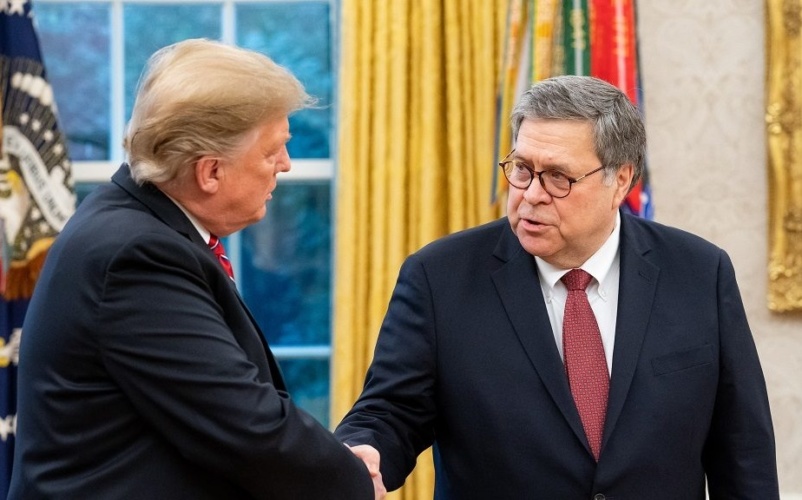Attorney General William Barr with Donald Trump (Tia Dufour/White House)
The House Judiciary Committee charges Attorney General William Barr with contempt of Congress, as Donald Trump asserts executive privilege to block any provision of the unredacted Mueller Report on Trump-Russia links and obstruction of justice.
The committee voted 24-16 on party lines after hours of debate on Wednesday. The Justice Department said the move was unnecessary and pledged a legal fight.
If the House of Representatives and its Democratic majority confirm the vote, it will be only the second time in US history that an Attorney General has been found to be in contempt.
Barr was charged over his repeated missing of deadlines to supply the unredacted report. The White House had indicated on Tuesday that Trump would intervene if the contempt vote was imminent.
Following Trump’s announcement and the vote, Judiciary Committee chairman Rep. Jerrold Nadler said, “We are now in a constitutional crisis.”
During the Committee debate, Nadler explained: “Our fight is not just about the Mueller report — although we must have access to the Mueller report. Our fight is about defending the rights of Congress, as an independent branch, to hold the president, any president, accountable.”
Justice Department spokeswoman Kerri Kupec insisted the contempt vote was “politically motivated and unnecessary.” She said it had “prematurely terminated” negotiations…and forced the president to assert executive privilege to preserve the status quo”.
Barr maintains that portions of the report must be withheld because of grand jury proceedings and protection of intelligence methods. Legislators have pointed out that the material can be supplied in confidence, as was the case during the Watergate hearings during the Nixon Administration in the 1970s.
Since his appointment in February, the Attorney General has tried to protect Trump, spinning the Mueller Report to falsely declare that there was no collusion between the Trump campaign and transition with Russian officials and intermediaries such as WikiLeaks. He has also quashed any pursuit of Trump’s obstruction or attempted obstruction of justice, despite the report’s evidence upholding the charge in eight of ten cases.
Barr appeared before the GOP-led Senate Judiciary Committee on May 1, but struggled with questions over his role, including a letter from Special Counsel Robert Mueller complaining that the Attorney General had misrepresented the 448-page report before it was published.
He refused to appear before the Democrat-controlled House Judiciary Committee the next day, saying he would not take questions from committee lawyers as well as legislators.
The Justice Department, which formally asked Trump to intervene, said the assertion of executive privilege is a “protective” measure to give Trump the time to review material before making a final determination.
However, the step appeared to be part of the White House’s wide-ranging effort to block further examination of Trump-Russia, obstruction, and Trump’s finances.
Trump’s staff have pressed witnesses such as former White House Counsel Donald McGahn, a key figure in the obstruction cases, not to testify or provide documents. Treasury Secretary Steven Mnuchin is refusing to comply with a House Ways and Means Committee request for Trump’s tax records, and Trump’s attorneys have filed lawsuits to prevent his accountants from handing over six years of financial statements to the House Oversight Committee.

